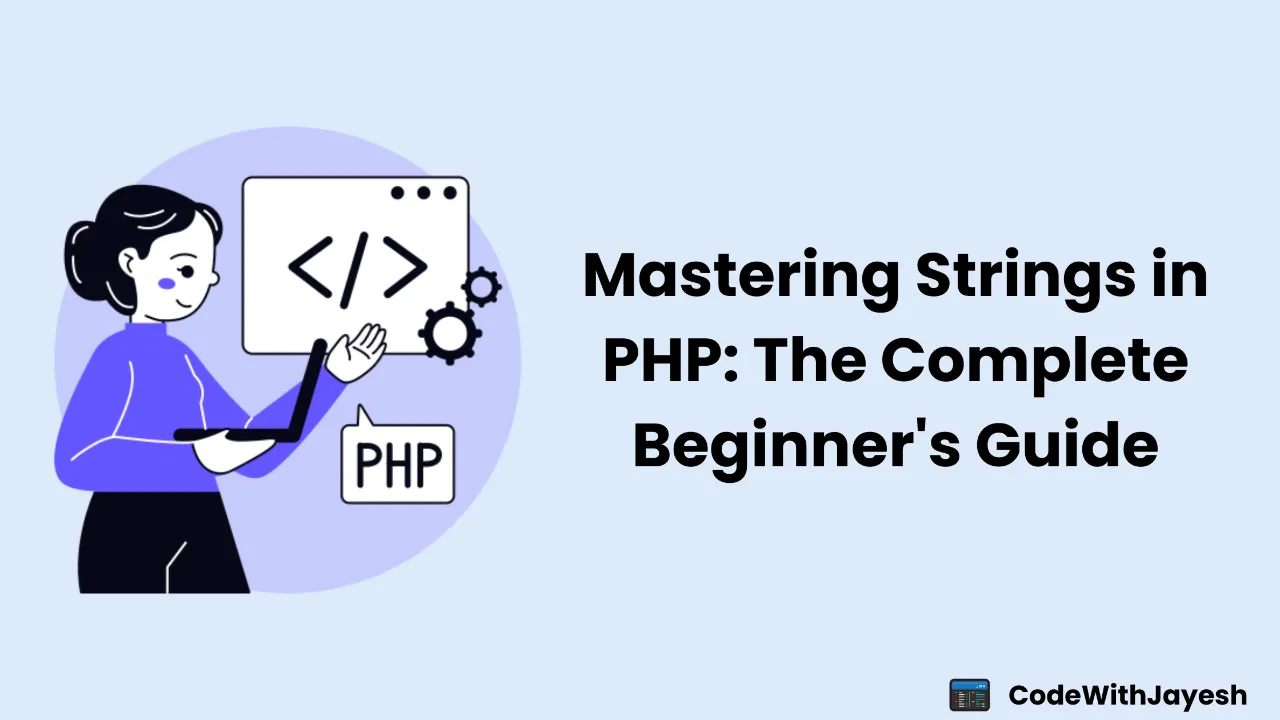👋 Hey there, PHP developer! When it comes to web development in PHP, one of the most common tasks you’ll encounter is handling strings. Whether you’re manipulating user input, formatting text for output, or parsing data, working with strings in PHP is a fundamental skill that every developer should learn.
In this post, we’ll take a friendly, practical approach to PHP strings, walk through the most useful string functions, and share real-world examples so you can confidently use strings in your next project.
What is a String in PHP?
A string in PHP is a series of characters—letters, numbers, and symbols—used to represent text. It can be as short as a single letter or as long as a full blog post. Strings are used everywhere: outputting content, storing user input, manipulating URLs, or even building SQL queries.
You can define strings using either single quotes (‘ ‘) or double quotes (” “). Understanding the difference between these two is important because double-quoted strings parse variables and special characters like \n (newline), while single-quoted strings do not.
$name = "Jayesh";
echo "Welcome, $name!\n"; // Outputs: Welcome, Jayesh! (with newline)
echo 'Welcome, $name!\n'; // Outputs: Welcome, $name!\n (as-is)Common String Functions in PHP
PHP provides a rich set of built-in string functions to help you manipulate and interact with text. Let’s walk through the ones you’ll likely use the most.
1. strlen() – Find the Length of a String
This function returns the number of characters in a string, including spaces and punctuation.
$text = "Hello!";
echo strlen($text); // Output: 62. strtolower() and strtoupper() – Change Case
These functions are perfect when you need to normalize strings for comparison or consistency.
echo strtolower("HELLO WORLD"); // hello world
echo strtoupper("php is fun"); // PHP IS FUNUse case: Email addresses (which are case-insensitive), search filters, or converting user input to a standard format.
3. ucfirst() and ucwords() – Capitalize Text
They help you format strings to make them more readable or properly styled.
echo ucfirst("welcome to php"); // Welcome to php
echo ucwords("welcome to php"); // Welcome To PhpUse case: Capitalizing names, titles, headings, or form outputs.
4. trim(), ltrim(), rtrim() – Clean Whitespace
Removes unnecessary spaces or special characters from user inputs.
$userInput = " Hello World! ";
echo trim($userInput); // "Hello World!"Use case: Processing form data, cleaning up CSV files, and handling copy-paste issues from users.
5. substr() – Extract a Portion of a String
substr() helps you slice and dice strings.
$message = "Welcome to PHP!";
echo substr($message, 0, 7); // WelcomeUse case: Trimming content previews, generating short codes, or extracting date parts from a string.
6. strpos() – Find Substring Position
Search for the position of one string within another string.
$sentence = "Learn PHP programming";
echo strpos($sentence, "PHP"); // 6Use case: Highlight search results, check file extensions, or validate substrings.
7. str_replace() – Replace Parts of a String
Swap out parts of a string with given string.
echo str_replace("JavaScript", "PHP", "I love JavaScript");
## Output:
// I love PHPUse case: Rewriting URLs, replacing banned words, or customizing template content.
Advanced String Handling Tips
Here are a few pro tips to level up your PHP string game.
# Check if a String Contains Another String (PHP 8+)
With PHP 8, you can use str_contains():
if (str_contains("I love PHP", "PHP")) {
echo "Yes, it's there!";
}Cleaner and easier than using strpos() + comparison.
# Repeat a String
Use str_repeat() to generate repeating content.
echo str_repeat("=", 10); // Output: ==========Useful for formatting, table separators, etc.
# Reverse a String
echo strrev("Hello"); // Output: olleHOkay, not always useful, but can be fun when doing challenges or puzzles.
# Remove Tags and Unsafe Input
When dealing with user input:
$input = "<script>alert('xss');</script>";
echo strip_tags($input); // Output: alert('xss');Always sanitize input before outputting to avoid XSS attacks.
String Interpolation Best Practices
String interpolation is the process of inserting variables directly into a string. In PHP, it’s a common way to build dynamic content—especially when generating HTML, writing logs, or building messages.
Using string interpolation in a clean, safe, and readable way—so your code is easy to maintain, secure, and less prone to bugs.
$name = "Jayesh";
echo "Hello, $name!"; // Good
// But this is safer and more flexible
echo "Hello, {$name}!";Using curly braces helps avoid confusing syntax, especially when combining variables with HTML.
Common Use Case: Building a Slug
Let’s build a simple slug from a blog title:
function createSlug($string) {
$slug = strtolower(trim($string));
$slug = preg_replace('/[^a-z0-9-]/', '-', $slug);
$slug = preg_replace('/-+/', '-', $slug);
return trim($slug, '-');
}
echo createSlug("Hello PHP World!"); // Output: hello-php-worldThis is perfect for URLs, article titles, and SEO optimization.
Sanitizing User Input
Never trust raw input. Use functions like htmlspecialchars() to safely render text.
$comment = "<script>alert('hack');</script>";
echo htmlspecialchars($comment); // <script>alert('hack');</script>Use case: Outputting user-generated comments or names in blogs or forms.
Comparing Strings
For exact matches, use ===. For case-insensitive comparison, use strcasecmp().
echo strcasecmp("php", "PHP"); // Output: 0Use case: Login systems, form validations, or filters where case should not matter.
Multibyte String Functions (UTF-8 Support)
Many languages use multibyte characters (e.g., Hindi, Japanese, Arabic). Use mb_* functions for safe string handling.
echo mb_strlen("नमस्ते"); // Outputs correct character countUse case: Supporting global languages, mobile apps, or translation systems.
🎯 Final Thoughts
PHP provides a powerful toolkit for managing and manipulating strings. Whether you’re working on a contact form, building a CMS, or generating SEO-friendly URLs, working with strings in PHP is a daily activity.
By mastering the functions and practices shared above, you’ll write cleaner, safer, and more efficient PHP code. Practice regularly and experiment with different use cases—strings are more fun (and useful!) than they look.
Explore additional data types in our detailed article Understanding Variables and Data Types in PHP
Happy coding, and keep stringin’ along! 🎸💻


Leave a Reply